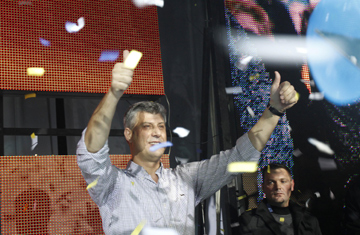
Kosovo's Prime Minister, Hashim Thaci, celebrates with his supporters in Pristina on Dec. 12, 2010
Kosovo's ferociously contested elections on Sunday — the nation's first general elections since it declared independence from Serbia in 2008 — failed to produce a clear victory for any single party. Despite widespread voter dissatisfaction, outgoing Prime Minister Hashim Thaci's Democratic Party of Kosovo (PDK) looks set to remain the biggest bloc in the parliament. But new parties made large inroads in a vote that was seen as test for the tiny country and its relationship with Serbia.
Thaci's supporters took to the streets in droves on Sunday night celebrating victory, though it will be hard for the PDK — the major partner in a coalition with the Democratic League of Kosovo (LDK), which has been in power since 2007 — to cobble together a government given the poll's fragmented outcome. In the run-up to the vote, the young, who make up a majority in Kosovo's skewed demographics, expressed particular dissatisfaction with the record of the outgoing government. "I hope the old government goes away and never comes back. They've harmed us young people too much," said 19-year-old student Alketa Sylaj while voting in Pristina.
Kosovo was administered by Serbia until 1999, when NATO bombings drove Serb forces out and established a U.N.-supervised local government. In February 2008, Kosovo decided to go it alone, but Serbia rejects Kosovo's independence and still claims the country as part of its territory. Though Kosovo, as a U.N. protectorate, has had its own elected parliament for a decade, many felt the significance of these first general elections since 2008. Interim President Jakup Krasniqi, who ran as No. 2 on the PDK list, had called the elections a test of Kosovo's "political maturity." And the first reports indicate no major flaws in the voting process. But the fragmentation of the results means that Kosovo may well be heading for a political stalemate.
With the economy being the biggest single campaign issue — the country suffers a 47% unemployment rate, and 17% of Kosovars live in extreme poverty, according to World Bank figures — new parties of various stripes made big gains. The biggest winner was LPV, the nationalist self-determination party of former student activist Albin Kurti, which came from nothing to claim 16% of the vote, according to an exit poll. And the New Spirit Party (FER), a last-minute centrist contender largely made up of foreign-educated professionals, won about 5%.
All this failed to unseat Thaci's PDK, which, according to exit polls, swept up 31% of the vote, roughly on par with previous elections in 2007. Its coalition partner in the outgoing government, LDK, was left trailing at 25%, though its leadership has refused to concede before the official results are in, likely by Monday evening.
While the election highlighted a lack of consensus among the voters, it also confirmed a widening rift within Kosovo's Serb minority between those in the north, where they form a solid majority, and those in the scattered pockets in the south. Southern Serbs came to the polls in unprecedented numbers, while northerners stuck to a boycott that aims to deny the legitimacy of Kosovo's breakaway from Serbia.
Speaking from the divided city of Kosovska Mitrovica, Jelko Kacin, a liberal member of the European Parliament and an election observer, tells TIME he saw only one person vote in the Serb-dominated part of town. "[The northerners] missed an opportunity to take care of themselves," he says. "This boycott is political suicide."
This time, the Serbian government did not call for a boycott, as it did with previous elections, after Kosovo became a U.N. protectorate. Instead, it told Kosovar Serbs that the conditions were not such that it could encourage them to vote. Not quite a U-turn, but significant nonetheless. Serbia has markedly changed its stance on Kosovo in the past few months, albeit from intransigence to ambiguity. After the World Court ruled in July that Kosovo's declaration of independence did not contravene international law, the Serbian government began to show willingness to talk, under the aegis of E.U. foreign policy chief Catherine Ashton.
And the high participation in the election by ethnic Serbs in the south confirmed a move toward further integration into the Kosovo state, even though most Serbs refuse to accept it as legitimate. The town of Gracanica, in the south, which hosts a large enclave of Serbs, saw an unprecedented turnout on Sunday. "The situation for us hasn't changed, and we don't expect it to. But I'm still voting for my children, for their future in this country," explained Serb voter Liljana Maksimovic.
The high turnout means that Serb parties are expected to claim some 15 seats in the 120-seat parliament under Kosovo's complicated voting system, which gives preferential seats to ethnic minorities. Meaning that, once the votes are all counted, the few could end up being kingmaker in the negotiations over a new coalition.
